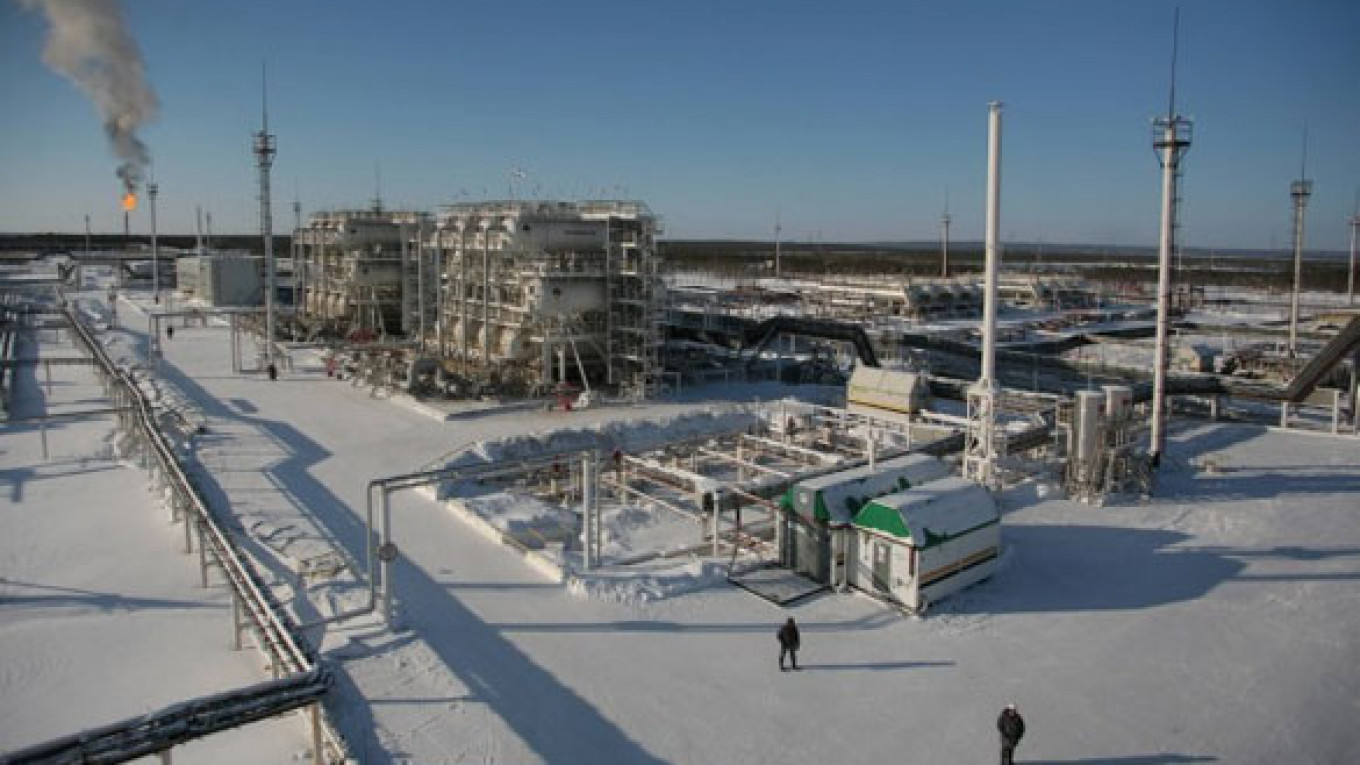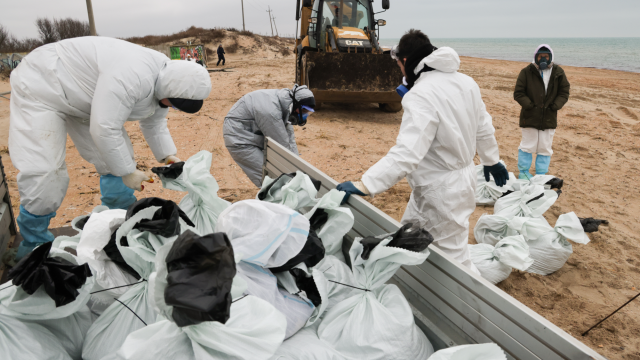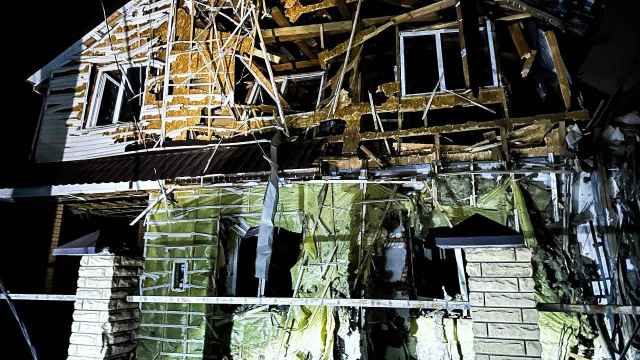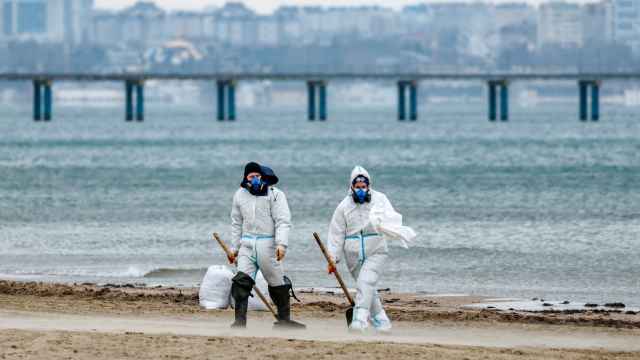Kremlin state oil champion Rosneft is speeding up investment in gas assets as it plans to more than double gas output by the end of the decade to take advantage of the gradual liberalization of the country's gas market, a top executive said.
Rosneft, already the world's largest listed oil firm by output, has seen its gas output trebling over the past year to 42 billion cubic meters — enough to meet gas demand in a country the size of France — thanks to acquisitions.
It wants to grow gas output to 100 billion cubic meters by 2020, enough to meet demand in a country like Britain, the biggest European gas market, channelling some of its about $20 billion in capital expenditure program towards gas projects.
"We have one of the largest global portfolios of new assets — about 20 percent today and it will grow to 40 percent in our production going forward — that requires substantial capex," vice president Svyatoslav Slavinsky said.
Headed by Igor Sechin, a close ally of President Vladimir Putin, Rosneft boosted its share of Russian oil output to more than 40 percent last year through its $55 billion acquisition of TNK-BP.
Along with Novatek, the country's No. 2 gas producer, it successfully lobbied for amendments that would allow it to sell liquefied natural gas abroad, breaking the export monopoly of state-controlled Gazprom.
"Our gas production grew to 42 bcm over the year which makes us No. 3 in terms of Russian gas production, so quite an important aspect of that and we maintain focus on our gas program throughout the year," Slavinsky said.
Rosneft has ambitions to become Russia's second-largest gas producer, with an output of 100 bcm of gas a year by 2020, up from about 13 bcm in 2012, backed by organic growth and acquisitions.
The Russian gas industry is dominated by Gazprom, which produced 479 bcm last year, or 73 percent of the country's total.
According to recent research by Sberbank CIB, Gazprom's domestic market share will drop to 53 percent by 2020, with Novatek and Rosneft getting 20 and 18 percent respectively.
In addition to TNK-BP, Rosneft agreed to buy gas company Itera and the gas assets of diamond company Alrosa in a bid to reach its goal. Along with ExxonMobil, it plans to build a plant to liquefy natural gas in Russia's Far East.
Still Spending
Slavinsky, who joined Rosneft last year from Citigroup to oversee its finances, said the company plans capital expenditures of about 700 billion rubles ($19.8 billion) this year to develop new fields.
In 2013, it spent 593 billion rubles on capital expenditures.
He added that Rosneft's business plan envisages an oil price of below $100 per barrel.
Rosneft on Tuesday posted 551 billion rubles in 2013 net profit, up 51 percent year-on-year, backed by acquisitions. Its oil production reached 4.2 million barrels per day, with organic growth of 1 percent.
Rosneft sees its annual oil output growth at about 1 percent in 2014 through 2017, accelerating to between 3 and 4 percent thereafter thanks to new fields and advanced drilling technologies.
Slavinsky added that Rosneft may look at opportunities in Mexico, which is opening up its energy sector to foreign companies.
LUKoil, Rosneft's closest domestic peer, signed a cooperation agreement with Mexican state-run firm Pemex last month.
"We are looking at different areas and Mexico is one of them. But we certainly look at projects together with our partners — Exxon, Statoil, Eni," he said.
"They all share interesting … ideas of what could be done together — they often invite us to join projects and Mexico could be one of those opportunities."
Annoucing BP’s fourth quarter profit of $2.8 billion, chief executive Bob Dudley said the company was pleased with the investment it made last year in the state-controlled Russian company, having folded its Russian business into Rosneft in exchange for a 19.75 percent stake.
The fourth quarter results were 28 percent lower than the same period a year ago but ahead of a consensus forecast of $2.7 billion, Reuters reported Tuesday.
"We will likely at some point, I think, set up some joint ventures with Rosneft onshore [in Russia]," Dudley said.
He said it was unlikely, however, that BP would partner with Rosneft in the Arctic, where several companies including Exxon have signed a deal, as the best acreage had already been snapped up.
Rosneft, which also reported earnings Tuesday, delivered $1.1 billion of BP's fourth-quarter profits.
A Message from The Moscow Times:
Dear readers,
We are facing unprecedented challenges. Russia's Prosecutor General's Office has designated The Moscow Times as an "undesirable" organization, criminalizing our work and putting our staff at risk of prosecution. This follows our earlier unjust labeling as a "foreign agent."
These actions are direct attempts to silence independent journalism in Russia. The authorities claim our work "discredits the decisions of the Russian leadership." We see things differently: we strive to provide accurate, unbiased reporting on Russia.
We, the journalists of The Moscow Times, refuse to be silenced. But to continue our work, we need your help.
Your support, no matter how small, makes a world of difference. If you can, please support us monthly starting from just $2. It's quick to set up, and every contribution makes a significant impact.
By supporting The Moscow Times, you're defending open, independent journalism in the face of repression. Thank you for standing with us.
Remind me later.






